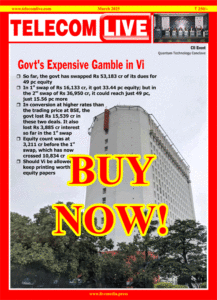Indian telcos may hike tariffs by 2025-end; market consolidation to benefit Jio, Airtel: Bernstein
India’s top telecom operators may further hike their tariffs by the end of this year, as part of the industry-wide rate repair efforts, which will likely see users shelling out more money to access mobile services, according to a brokerage firm.
‘We expect the tariff hike to continue over the medium term to reach ₹300 by FY27. We anticipate a tariff hike in November/December 2025, in line with ongoing tariff repair efforts across the industry,’ analysts at Bernstein said in a research note, seen by ETTelecom.
The tariff hike could serve as a catalyst and enhance the revenue visibility for the sector. The global brokerage firm estimates mid-to-high teen revenue growth for the top telecom carriers – Bharti Airtel and Reliance Jio between 2025 and 2027, led by strong average revenue per user (ARPU) growth and steady subscriber additions.
In the October-December 2024 quarter, Airtel’s ARPU grew by 5.2% sequentially to ₹245, supported by the flow-through of tariff hikes in early 2024, feature phone to smartphone upgrades, prepaid to postpaid upgrades, data monetisation and growth of international roaming, while 5G coverage expansion continues as planned. By contrast, Jio’s ARPU was up by 4.2% sequentially to ₹203, followed by Vi (₹163).
Bernstein analysts, however, said that the residual impact of the tariff hike undertaken in July 2024 has yet to play out.
Notably, the top telcos – Jio, Airtel, and Vi – had increased their headline rates by 20-25% in order to improve their ARPU and shore up money to invest sustainably in building out and expanding their respective fifth-generation (5G) networks
Bernstein expects the Indian telecom industry to undergo further consolidation by FY27, with revenue market share dominated by Jio (48%) and Airtel (38%) by then.
The Mukesh Ambani-led telco’s subscriber market share may reach 47%, while the Sunil Mittal-driven telco’s subscriber share may also increase to 35%, as per Bernstein.
Financially-struggling Vi received a shot in the arm recently after the Central government decided to convert ₹36,950 crore of the telco’s outstanding spectrum dues into equity shares, which will increase the government stake in the telecom joint venture between the Aditya Birla Group and UK’s Vodafone Group Plc to around 49% from 22.6% previously.
Subsequently, Vi’s board also cleared the conversion of these spectrum dues into equity. The conversion will reduce the telco’s statutory liabilities and is slated to give it over ₹40,000 crore of cash flow relief over the next three years, ET reported previously.
‘The equity conversion signals the government’s commitment to preserve a three-player market structure and increases the probability of price discipline and a future tariff hike,’ the analysts said.
Meanwhile, Bernstein projected that Airtel will continue the trajectory of improving its free cash flow (FCF) and deleveraging, supported by stable ARPU, operating leverage, and a disciplined capital expenditure (capex).
Airtel’s ROCE is projected to reach ~18% by FY27, reflecting improved capital efficiency, whereas the net debt-to-EBITDA is expected to decline to ~0.9x by FY27, highlighting continued balance sheet strength and a strong FCF cycle.
‘The higher capex intensity in FY23/24 was due to the 5G spectrum rollouts. We expect capex cycle will start to moderate with the completion of the 5G expansion. Telecom capex would normalise down to 15-20% of revenue by FY26-27 and consequently expect a strong increase in the free cashflow generation,’ said Bernstein.
It added that Indian telcos, led by Airtel, are best positioned in the industry as growth acceleration is led by rise in ARPU, improving balance sheet and increasing free cash flows.
‘Bharti has outperformed on a relative basis the Nifty and all the Asia peers over the last 3 months. Bharti up 10.1% year-to-date (YTD), while Indus Towers is up by YTD. In comparison, Asian telcos are down -5% to -30% YTD,’ it noted.



